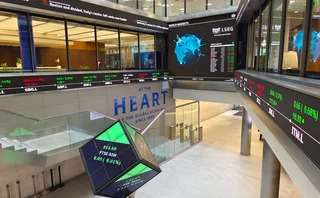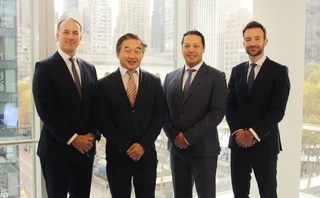
Interest rate derivatives house of the year: Deutsche Bank
Asia Risk Awards 2021

Ahead of the upcoming new accounting standard International Financial Reporting Standard 17 (IFRS 17), addressing asset and liability duration mismatches is a growing focus of insurance companies the world over. But containing such balance-sheet mismatches with traditional interest rate swap hedges is far from straightforward, especially for those local insurers operating in Asia’s notoriously illiquid emerging markets.
As a pioneer of bond-linked derivatives solutions in onshore Asian markets, Deutsche Bank has been transforming the way that insurance clients in these markets hedge such mismatches.
“A big part of our interest rate derivatives offering in the region is what we call bond-linked derivatives,” says Ashok Das, head of Asia local markets trading and solutions at Deutsche Bank in Singapore.
“This includes all the duration extension swaps we’ve done that are catering to local and international clients and their needs around the asset and liability mismatches that they have.”
Under IFRS 17, insurers will be forced to use a market interest rate to calculate future liabilities in the general account, which until now have been valued at cost. If that were not challenging enough in itself, falling interest rates since the onset of the Covid-19 pandemic are also inflating the value of insurers’ liabilities that will need to be marked to market under the new standard.
A key pain point for insurers is that the liabilities on their books are typically long-dated high-interest-rate fixed-guarantee policies, which are difficult to match on the asset side, given the dearth of liquidity in long-dated cash bonds across many of the region’s secondary markets.
A setup like ours is crucial to doing these bond derivatives trades: the entry hurdle to [doing] these kind of products is very high
Ashok Das, Deutsche Bank
What is more, hedging these duration mismatches with interest rate swaps is also challenging for a South Korean or Indian insurer, due to thin liquidity and a lack of depth in tenor in local swaps markets.
Bond forward and bond forward rate agreements (FRAs), which Deutsche Bank has traded with numerous clients across Asian emerging markets, offer a neat solution to the conundrum. The contracts are easy to understand, and enjoy greater liquidity at the long tenors that insurers look to tap.
The instruments have proven particularly popular with clients across Asia, many of which have seen unprecedented inflows into their guaranteed return policies over the course of the pandemic.

Deutsche Bank enjoys certain advantages over its competitors in Asia’s bond derivatives market, which go a long way towards explaining how the bank maintains its market-leading position.
Das says the strength of the bank’s cash bond franchise is one such advantage. The bank’s ability to generate the underlying bonds for derivatives solutions is helped by having an onshore presence in 12 countries across the Asia-Pacific region, with primary dealer licences in many of these markets.
The other advantage, Das says, is having the infrastructure across the bank globally to allow locally funded bonds to be integrated into global liquidity pools managed from hub markets such as Singapore.
“A setup like ours is crucial to doing these bond derivatives trades: the entry hurdle to [doing] these kind of products is very high,” says Das.
“Presence in onshore local markets, access to multiple liquidity pools and ability to manage risk across multiple aspects of these trades [are] key to this business.”
Finally, a key reason the bank has been able to so successfully scale its bond derivatives business is its ability to lay off risk by circulating it through other client segments globally.
Leveraging synergies across markets, products and client segments is also a reason for the bank’s competitiveness in other areas of its fixed income franchise – such as the work the bank does as an arranger for euro medium-term note issuances in Asian currencies such as Indonesian rupiah, Philippine peso and offshore renminbi.
In these deals, issuers look to fund in either US dollars or euros, giving rise to demand for cross-currency swaps. Das says the bank is able to compete in this space largely because of its ability to win these cross-currency swap hedges among competing bids from competitors.
“Bond-linked derivatives have specific advantages over swaps especially in onshore Asian markets in terms of being able to provide access to significant pools of liquidity and to longer tenors,” says Siddharth Chaturvedi, co-head of institutional client group macro sales Asia.
“Solutions provided by Deutsche Bank have benefited a diverse set of local and international investors, and have addressed a wide range of client requirements: from duration hedging, to yield enhancement, to hedging balance sheet risk, to local market access and leverage.”
Transparency in sustainability
Another highlight of the past year is Deutsche Bank’s continued efforts to support the sustainability goals of clients in the region through its interest rate derivatives franchise.
In 2020, the bank traded an award-winning first foreign exchange forward hedge linked to environmental, social and governance (ESG) metrics, with a Singaporean food and agribusiness multinational. This year, the bank built on that success by executing a first green hedge backed by the opinion of a second-party ESG consultant, rather than metrics reflecting the client’s own ESG policy.
The trade was for an Indian corporate that wanted to hedge a US dollar green bond, which it had issued in order to tap a wider foreign investor base. Since the proceeds of the bond were intended to finance various green projects in India, the corporate client was exposed to USD/INR FX risk, giving rise to a need for a cross-currency swap hedge.
But while it has, for some time, been market practice for an external ESG consultant to issue a second-party opinion for green bonds, there is no such requirement for the hedges of green bonds. Deutsche Bank, however, believed that a second-party opinion would in this instance provide investors in the bond greater confidence on the issuer’s risk-mitigation strategies, ensure long-term sustainability of the green projects and safeguard the repayment obligations of the green bond. The client will include the green hedging transaction as part of its green bond allocation report.
So, alongside green bond underwriting, which is now a big part of Deutsche Bank’s cash bond franchise, the bank is now able to provide green derivatives that are subject to exactly the same transparency requirements as the bonds they are intended to hedge.
“What we’ve done here is provide a hedge alongside a green bond for an Indian client that provides transparency – not just on how they use the money from the financing, but also around how they risk-manage the cashflows of that asset going forwards,” says Andrew Pankhurst, director of Asia-Pacific risk management solutions at Deutsche Bank in Singapore.
“This is particularly important for emerging markets because the macro environment is much more volatile, and you want to make sure that the risks are being managed in a prudent way.”
Only users who have a paid subscription or are part of a corporate subscription are able to print or copy content.
To access these options, along with all other subscription benefits, please contact info@risk.net or view our subscription options here: http://subscriptions.risk.net/subscribe
You are currently unable to print this content. Please contact info@risk.net to find out more.
You are currently unable to copy this content. Please contact info@risk.net to find out more.
Copyright Infopro Digital Limited. All rights reserved.
As outlined in our terms and conditions, https://www.infopro-digital.com/terms-and-conditions/subscriptions/ (point 2.4), printing is limited to a single copy.
If you would like to purchase additional rights please email info@risk.net
Copyright Infopro Digital Limited. All rights reserved.
You may share this content using our article tools. As outlined in our terms and conditions, https://www.infopro-digital.com/terms-and-conditions/subscriptions/ (clause 2.4), an Authorised User may only make one copy of the materials for their own personal use. You must also comply with the restrictions in clause 2.5.
If you would like to purchase additional rights please email info@risk.net
More on Awards
Clearing house of the year: LCH
Risk Awards 2025: LCH outshines rivals in its commitment to innovation and co-operation with clearing members
Best use of machine learning/AI: CompatibL
CompatibL’s groundbreaking use of LLMs for automated trade entry earned the Best use of machine learning/AI award at the 2025 Risk Markets Technology Awards, redefining speed and reliability in what-if analytics
Markets Technology Awards 2025 winners’ review
Vendors jockeying for position in this year’s MTAs, as banks and regulators take aim at counterparty blind spots
Equity derivatives house of the year: Bank of America
Risk Awards 2025: Bank gains plaudits – and profits – with enhanced product range, including new variants of short-vol structures and equity dispersion
Law firm of the year: Linklaters
Risk Awards 2025: Law firm’s work helped buttress markets for credit derivatives, clearing and digital assets
Derivatives house of the year: UBS
Risk Awards 2025: Mega-merger expected to add $1 billion to markets revenues, via 30 integration projects
Interest rate derivatives house of the year: JP Morgan
Risk Awards 2025: Steepener hedges and Spire novations helped clients navigate shifting rates regime
Currency derivatives house of the year: UBS
Risk Awards 2025: Access to wealth management client base helped Swiss bank to recycle volatility and provide accurate pricing for a range of FX structures







